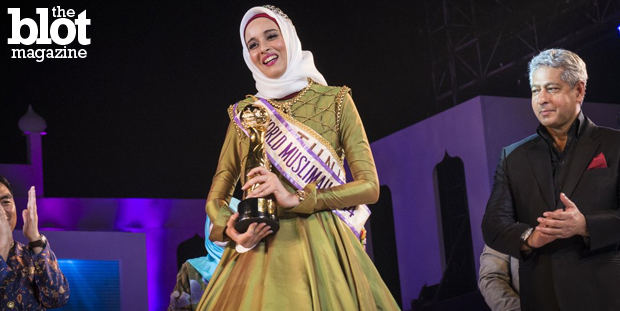I love oxymorons, those terms that appear to be self-contradictory. You know the usual examples of “military intelligence” and “happily married,” which are unfair to the many bright people in uniform and to married people who know they’d be miserable otherwise. In this category is “Muslim Beauty Pageant.” Islam is, after all, a faith that emphasizes (sometimes even over-emphasizes) modesty among its female adherents. That doesn’t really go with the swimsuit portion of the competition you see during Miss America or its rivals. Yet, there it was, on BBC3 not long ago, an hour-long documentary about the Miss World Muslimah contest held this past December in Indonesia.
Dina Torkia vlogs about Muslim fashion, and she apparently has quite a following. She was also Miss U.K. for the contest in December, and it was her documentary the Beeb showed.
“Developed by Eka Shanty, a former Indonesian TV presenter who lost her job because she refused to take off her hijab on the air, the pageant’s formal name is the World Muslimah Award. But it’s known informally as the Miss Muslimah, perhaps because it is billed as Islam’s answer to Miss World,” explained our good friends over at Al Jazeera (a horribly underrated and under-appreciated news organization).
This documentary was quite an eye-opener for me, and I consider myself rather familiar with Islamic culture. As a student in London, I had neighbors from Bangladesh and Pakistan, studied with Turks and Arabs, and I even dated a Moroccan girl who wore no headscarf and preferred short skirts (well, three dates anyway, till she broke it off). Here in New York, I’ve been to baseball games and dinner parties with Muslim friends. I know the difference between Shia and Sunni, and I have actually read the Koran (and the Bible, the Bhagavad Gita, and “The Epic of Gilgamesh,” and I still prefer “The Three Musketeers”).
But I wasn’t really prepared for the way the followers of the Prophet adapted the idea of a beauty pageant to their culture. “Instead of bikini parades and talent quests,” wrote Al Jazeera’s Katie Lamb, “Miss Muslimah contestants take part in recitals from the Koran, Islamic shopping challenges and debates about whether nail polish is haram, or forbidden under Islamic law.” The Huffington Post ran a piece recently about the contest that stated, “Throughout the pageant, challenges include reciting Quran passages, volunteering in nursing homes, debating Muslim values and touring impoverished communities.”
Read more: Four Gay Men Hate-Watched the Miss Universe Pageant
Of course, some feel that any beauty pageant is demeaning to women, and this is no exception. “This is insulting to Muslim women, they shouldn’t be wearing makeup or high heels, both of which are very unhealthy. They should be judged on their natural beauty,” one commenter wrote on the Al Jazeera story, adding, “And what is that part at the end about a finger scan and a ‘psycho’ test with some odd questions? Look at what’s really going on here. This is a set up to make beautiful, intelligent Muslim women make fools of themselves by dressing up in absurd outfits and makeup and demeaning themselves publicly by answering offensive questions.”
But let’s recall how the beauty pageant came to be in the first place. Atlantic City, N.J., was trying desperately to attract tourists back in 1921, and someone hit on the idea of finding the most beautiful girl (they weren’t women then) in the country. Thus, Miss America was founded for commercial reasons.
It’s nice to see that the Islamic world hasn’t changed that. “Privately [the contestants] criticize the corporate cosmetics sponsor that some felt pushed into endorsing and the fact that all contestants, including Miss Nigeria and Miss Bangladesh, were given skin lightening creams,” wrote Lamb.
All told, “Miss Muslimah has the potential to be really beneficial for Muslim women,” Miss U.K. Dina Torkia told Al Jazeera, “but right now I feel like it is a bit embarrassing.”
Well, Ms. Torkia, Miss Muslimah scores well ahead of Miss USA and Miss Universe. Donald Trump runs those. Maybe with all the nonsense he’s spouting these days, that might end.
Inshallah.
Watch Dina Torkia in “A Muslim Beauty Pageant and Me:”
Jeff Myhre is a contributing journalist for TheBlot Magazine.






